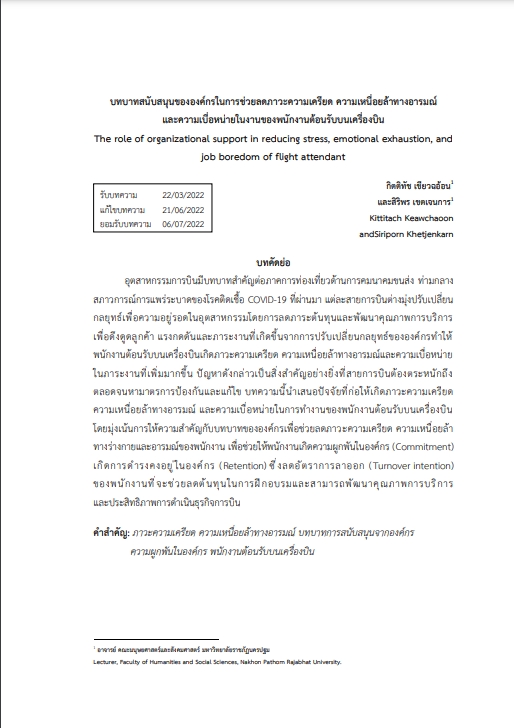บทบาทสนับสนุนขององค์กรในการช่วยลดภาวะความเครียด ความเหนื่อยล้าทางอารมณ์ และความเบื่อหน่ายในงานของพนักงานต้อนรับบนเครื่องบิน
คำสำคัญ:
ภาวะความเครียด, ความเหนื่อยล้าทางอารมณ์, บทบาทการสนับสนุนจากองค์กร , ความผูกพันในองค์กร , พนักงานต้อนรับบนเครื่องบินบทคัดย่อ
อุตสาหกรรมการบินมีบทบาทสำคัญต่อภาคการท่องเที่ยวด้านการคมนาคมขนส่ง ท่ามกลางสภาวการณ์การแพร่ระบาดของโรคติดเชื้อ COVID-19 ที่ผ่านมา แต่ละสายการบินต่างมุ่งปรับเปลี่ยนกลยุทธ์เพื่อความอยู่รอดในอุตสาหกรรมโดยการลดภาระต้นทุนและพัฒนาคุณภาพการบริการเพื่อดึงดูดลูกค้า แรงกดดันและภาระงานที่เกิดขึ้นจากการปรับเปลี่ยนกลยุทธ์ขององค์กรทำให้พนักงานต้อนรับบนเครื่องบินเกิดภาวะความเครียด ความเหนื่อยล้าทางอารมณ์และความเบื่อหน่ายในภาระงานที่เพิ่มมากขึ้น ปัญหาดังกล่าวเป็นสิ่งสำคัญอย่างยิ่งที่สายการบินต้องตระหนักถึง ตลอดจนหามาตรการป้องกันและแก้ไข บทความนี้นำเสนอปัจจัยที่ก่อให้เกิดภาวะความเครียด ความเหนื่อยล้าทางอารมณ์ และความเบื่อหน่ายในการทำงานของพนักงานต้อนรับบนเครื่องบิน โดยมุ่งเน้นการให้ความสำคัญกับบทบาทขององค์กรเพื่อช่วยลดภาวะความเครียด ความเหนื่อยล้าทางร่างกายและอารมณ์ของพนักงาน เพื่อช่วยให้พนักงานเกิดความผูกพันในองค์กร (Commitment) เกิดการดำรงคงอยู่ในองค์กร (Retention) ซึ่งลดอัตราการลาออก (Turnover intention) ของพนักงานที่จะช่วยลดต้นทุนในการฝึกอบรมและสามารถพัฒนาคุณภาพการบริการและประสิทธิภาพการดำเนินธุรกิจการบิน
เอกสารอ้างอิง
กิตติทัช เขียวฉอ้อน. (2564). แนวทางการสร้างความประทับใจแก่ลูกค้าของธุรกิจในอุตสาหกรรมบริการท่ามกลางสภาวะความปกติใหม่ (New Normal). วารสารการบริหารการปกครองและนวัตกรรมท้องถิ่น, 5 (1), 201-212.
จิระพร อุดมกิจ. (2539). ปัจจัยที่มีผลต่อความเครียดในการทํางานของบุคลากรคอมพิวเตอร์ในเขตกรุงเทพมหานคร. วิทยานิพนธ์ศิลปศาสตรมหาบัณฑิต สาขาวิชาจิตวิทยาอุตสาหกรรม บัณฑิตวิทยาลัย มหาวิทยาลัยธรรมศาสตร์.
ธันยพร วาศประเสริฐ. (2550) ความสัมพันธ์ระหว่างปัจจัยในการทำงาน ความสามารถในการเผชิญและฟันฝ่าอุปสรรคและความเครียดของพนักงานฝ่ายลูกค้าสัมพันธ์: กรณีศึกษา บริษัททรูมูฟ จำกัด มหาวิทยาลัยธรรมศาสตร์. กรุงเทพฯ. มหาวิทยาลัยธรรมศาสตร์
สงวน ลือเกียรติบัณฑิต. (2542). อาการเหนื่อยหน่ายในการทำงาน: ประวัติการพัฒนามโนทัศน์ความหมาย และการวัด. วารสารมหาวิทยาลัยสงขลานครินทร์, 5 (2), 168-178.
โสภณ ตระการวิจิตร. (2559). บทบาทสนับสนุนขององค์กรในการช่วยลดภาวะความเครียด ความเหนื่อยล้าทางอารมณ์ และความเบื่อหน่ายในงานของพนักงานต้อนรับบนเครื่องบิน. กรุงเทพฯ: สถาบันบัณฑิตพัฒนบริหารศาสตร์
Chang, C.-P. & Chiu, J.-M. (2009). Flight attendants’ emotional labor and exhaustion in the Taiwanese airline industry. Journal of Service Science and Management, 2 (04), 305.
Chen, C.-F. & Chen, S.-C. (2012). Burnout and work engagement among cabin crew: Antecedents and consequences. The International Journal of Aviation Psychology, 22 (1), 41-58.
Cho, J.-E., Choi, H. C. & Lee, W. J. (2014). An empirical investigation of the relationship between role stressors, emotional exhaustion and turnover intention in the airline industry. Asia Pacific Journal of Tourism Research, 19 (9), 1023-1043.
Cooper, C. L. & Cartwright, S. (1997). An intervention strategy for workplace stress. Journal of psychosomatic research, 43 (1), 7-16.
Dallimore, K. S., Sparks, B. A. & Butcher, K. (2007). The influence of angry customer outbursts on service providers' facial displays and affective states. Journal of Service Research, 10 (1), 78-92.
Eisenberger, R., Fasolo, P. & Davis-LaMastro, V. (1990). Perceived organizational support and employee diligence, commitment, and innovation. Journal of Applied Psychology, 75 (1), 51.
Eisenberger, R. & Stinglhamber, F. (2011). Perceived organizational support: Fostering enthusiastic and productive employees. Washington, D.C.: American Psychological Association.
Eisenberger, R. et al. (2002). Perceived supervisor support: contributions to perceived organizational support and employee retention. Journal of Applied Psychology, 87 (3), 565.
Ekman, P. (1973). Cross-cultural studies of facial expression. In P. Ekman (Ed.), Darwin and facial expression: A century of research in review (pp.169 - 222). New York: Academie Press
Eurostat. (2005). Europe in figures: Eurostat yearbook 2005 (Vol. 1): Bastern Africa: Flagship Publications.
Freudenberg, H. J. (1974). Staff burnout. Journal of social issues, (1), 159-164.
Gilbert, D. & Wong, R. K. (2003). Passenger expectations and airline services: a Hong Kong based study. Tourism Management, 24 (5), 519-532.
Grandey, A. A. (2000). Emotional regulation in the workplace: A new way to conceptualize emotional labor. Journal of occupational health psychology, 5 (1), 95.
Hochschild, A. R. (2012). The managed heart. Berkley, CA: University of California press.
Hur, W. M., Moon, T. W. & Jun, J. K. (2013). The role of perceived organizational support on emotional labor in the airline industry. International Journal of Contemporary Hospitality Management. 25 (1), 105-123.
Judge, T. A., Scott, B. A. & Ilies, R. (2006). Hostility, job attitudes, and workplace deviance: test of a multilevel model. Journal of Applied Psychology, 91 (1), 126–138.
Khetjenkarn, S. & Agmapisarn, C. (2020 a). The effects of emotional labour on the outcomes of the job and the organization: Do the differences in age and the manager’s emotional intelligence have any impact in the hotel business? European Journal of Tourism Research, 25, 2504.
_______. (2020 b). Individual employee factors affecting emotional labor and job outcomes: a case study of hotel frontline employees in Phuket. ABAC journal, 40 (1), 58-84.
Lee, R. T. & Ashforth, B. E. (1996). A meta-analytic examination of the correlates of the three dimensions of job burnout. Journal of Applied Psychology, 81 (2), 123-133.
Leiper, N. (1979). The framework of tourism: Towards a definition of tourism, tourist, and the tourist industry. Annals of Tourism Research, 6 (4), 390-407.
Luckmann, J. & Sorensen, K. C. (1975). What patients' actions tell you about thier feelings, fears & needs. Nursing2021, 5 (2), 54-61.
Lumsdon, L. & Page, S. (2004). Tourism and transport-Issues for the new millennium. Oxford: Elsevier.
Morash, E. A., & Ozment, J. (1994). Toward management of transportation service quality. Logistics and Transportation Review, 30 (2), 115.
Robbins, S. P. (2001). Organisational behaviour: global and Southern African perspectives: London: Pearson
Sinanuwong, P., Agmapisarn, C. & Khetjenkarn, S. (2021). Linking Cabin Crew’s Motivation to Service Performance: The Mediating Role of Ambidextrous Behavior. ABAC journal, 41 (3), 155-173.
Skinner, B. F. (2014). Contingencies of reinforcement: A theoretical analysis (Vol. 3). Cambridge, MA: B.F. Skinner Foundation.
Xuan, X. et al. (2021). Will COVID-19 threaten the survival of the airline industry? Sustainability, 13 (21), 11666.
Yoon, J. & Lim, J.-C. (1999). Organizational support in the workplace: The case of Korean hospital employees. Human Relations, 52 (7), 923-945.

ดาวน์โหลด
เผยแพร่แล้ว
รูปแบบการอ้างอิง
ฉบับ
ประเภทบทความ
สัญญาอนุญาต
ลิขสิทธิ์ (c) 2022 วารสารวิชาการมนุษยศาสตร์และสังคมศาสตร์ มหาวิทยาลัยราชภัฏนครปฐม

อนุญาตภายใต้เงื่อนไข Creative Commons Attribution-NonCommercial-NoDerivatives 4.0 International License.
วารสารวิชาการมนุษยศาสตร์และสังคมศาสตร์ มหาวิทยาลัยราชภัฏนครปฐม





